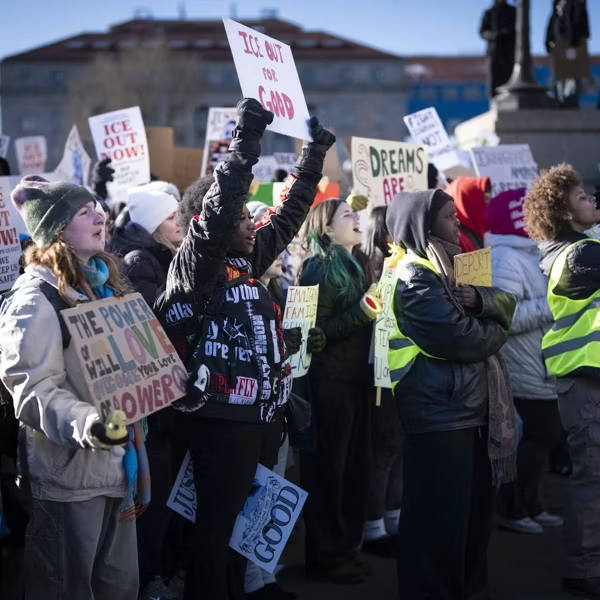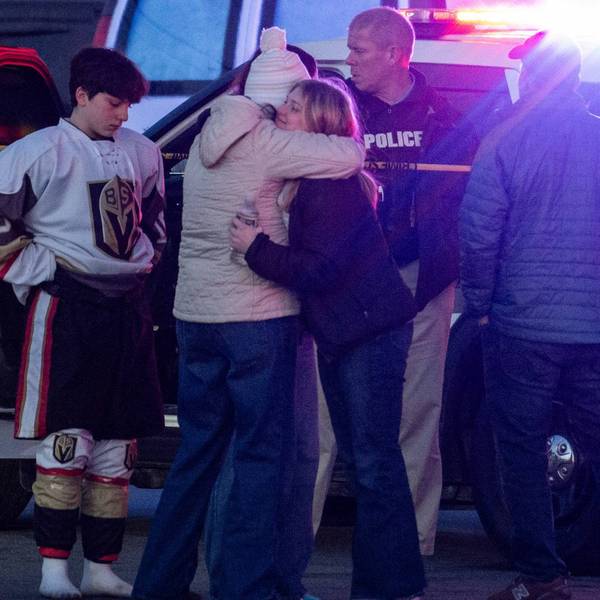Leslie Gaar is an educational consultant, mother of three, former teacher and writer who lives in Texas. She was recently at a school coaching a prekindergarten teacher on how to meet district goals when a lockdown was called. It wasn't a drill.
"Why are your eyes red?" The big black eyes looked curiously at me as their owner asked a question I didn't know how to answer. "Oh I'm just kind of hot," I whispered. The worried little chubby face softened into a shy smile. "Me too." The two of us were huddled in a tiny bathroom with 20 or so other students and their teachers. We barely fit inside.
Just minutes before a lockdown had been announced at the elementary school where I'd been working with a teacher. The two of us had flown to the classroom after hearing the announcement, herding the preschoolers into the bathroom.
Students from the neighboring classroom had filed wide-eyed into the next bathroom over. They seemed to grasp the gravity of the situation more than the 4-year-olds I was with, but then, they were older and more familiar with this; they were 6 years old, after all, and had more experience with these things.
Years before I'd done lockdown drills with my own students, but I'd never witnessed the real thing. And, oh God, this was the real thing.
The teacher began softly reading a picture book to try to keep the kids occupied. I tried to text my husband and family, feeling overdramatic at first and then reasoning I would rather come off as overdramatic than, well, it was just better to text them.
And there we all were, the preschoolers, their teachers and me, listening to the story and listening for gunshots. I certainly was, and I felt like I was going to jump out of my skin. What was happening out there? What was taking so long? Surely this was a false alarm.
But I knew the statistics. And I knew why these kids knew exactly what to do the second the word "lockdown" was spoken -- because in so many other places on so many other days it was completely real. And it could be real here, too, now, on the other side of these few inches of wood I was leaning against, the only thing separating us from whatever was going on outside.
My heart started to race faster. My eyes filled with tears again, and I turned them away from the inquisitive little black eyes. I instinctively hugged the kids nearest to me as closely as I could, taking two of them onto my lap. If it was someone else in here with my own kids, I would hope they would comfort them, and since it was me here I would do the same.
My mind flew to my kids, sick at home, my youngest the same age as these students here. They were probably still in their pajamas, watching movies with bleary eyes, completely unaware of what was happening across town. My throat squeezed shut.
I shoved panic down, focusing on the children surrounding me. The students were getting antsier by the minute, physically unable to comply with their teacher's pleas to stay quiet. The little girl next to me kept inadvertently bumping the door with her small frame in an attempt to get more comfortable.
Every time she did so, it made a loud banging sound. One of the teachers and I tried to get her to hold still, but the banging continued. I felt a hysterical laugh rise inside me. "You're going to get us killed, kid!" I thought.
Any attempt to keep a pack of 4-year-olds silent is comical in the best of circumstances, and in this one it felt like the darkest of dark jokes. And that was before they all decided, after being close to the toilet for so long, that they absolutely, positively had to use the bathroom.
If he breaks in here ...
But he's not going to. It's got to be a false alarm.
I know, but if he does ...
He won't. He can't. Is there even anyone out there?
Please just let him kill me quickly. PLEASE. I can't lie here on the ground wounded, watching these kids suffer. Please just let it be fast.
I made room for a third child on my lap, and I remembered the trite, rote responses to my last email begging my representatives for gun-reform legislation. The virtual pat on the head. "Your concerns are very important to us. The Senator believes in citizens' right to arm themselves ..." The memory made me shake with anger. "Our thoughts and prayers ..."
I thought:
Where are your thoughts and prayers now, senator? I can't feel them here on this linoleum floor with these impossibly tiny bodies squirming around me. Look over there, senator. Send your thoughts and prayers to that 4-year-old boy crying in the corner. Tell him how hard you fought to protect his fragile little life. Tell him your significant campaign donations from the NRA had no bearing on your decision to vote against common sense measures that would pull him out of this smelly bathroom and into his classroom, where he should be. Explain that your donors' "right" to own military-grade weapons outweighs his right to attend school without being murdered or traumatized. Tell him, sir. I'm listening.
And all of a sudden, it was over.
My ears, pricked so long for the sounds I dreaded suddenly heard a jangling of keys and a friendly voice telling us we could come out now. We poured out of the bathroom. The children settled back into play. My texts to my family finally went through as my reception picked back up.
I gathered the few remaining shreds of my nerves, said a few words of encouragement to the teachers, picked up my things and headed home. It was a normal, sunny day outside. A man walked by, lazily laughing as he talked on his phone.
It turned out that there had been a shooting in the neighborhood. Since the suspect had fled the scene before being apprehended, police had put the schools in the area on lockdown as a precaution. Standard procedure. Nothing special, nothing out of the ordinary, nothing even in the news.
Later, after briefly posting about my experience on Facebook, I would find out just how heartbreakingly ordinary it was as person after person shared similar stories: a 6-year-old who had proudly told his mom how quiet he had been during a lockdown at his school; a 5-year-old who had asked her grandmother if she had a lockdown plan in place at her home.
My experience with those kids and their teachers -- the scariest, most viscerally terrifying one I can remember -- is absolutely commonplace now in this country. A cliche even. As American as apple pie.




